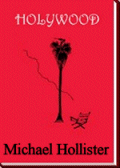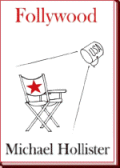Novelist & Critic
HOME PAGE
BIOGRAPHY
MODEL OF METAPHORS
DANEgerus
Patrick Garry, novelist
Triumph of the Will
Triumph of the Will appears on the screen in old style German lettering with an English subtitle. The gritty black and white documentary has the look of a Warners melodrama, opening with a classical orchestral soundtrack and a steady omniscient camera in the clouds with God. Old Nuremburg appears below like a toy city of dolls and cuckoo clocks, with columns of toy soldiers marching in the streets, as wholesome looking as the movies of Louie B. Mayer. Then the shadow of an airplane falls upon the city. The star and producer descends out of the sky and emerges from a white airplane in an army uniform, met by his Minister of Propaganda. It is a second coming. Germany got crucified in the world war, intones the documentary, but a great renaissance has begun.
The savior is short like many stars and handsome in a stern way, especially as compared to the officers around him, with a regiment of whiskers on his upper lip like Charlie Chaplin. He wears his straight black hair slicked down in the romantic style of Valentino, except in a military cut, standing bareheaded and erect in an open touring car exposed to snipers, raising his palm in stiff salutes to the people lining the streets waving and saluting and throwing flowers, women in rapture, men in awe. Windy flags and long banners hanging from every window are emblazoned with the swastika, emblazoned too the thousands of flags and square banners on standards evolved from tribes who only recently emerged in animal skins from the dark misty forests of primeval Europe.
Trumpets in unison sound like the entrance of a bull to the world arena, heralding a god. Then boys playing fifes and drums evoke the American Revolution, becoming a motif with torches and bonfires and smoke recalling and anticipating battles. As they pass in review, the star extends his arm in a rigid salute, then snatches it back as though grabbing a handful of souls. Blonde children in close-up look up to him. Windows frame Aryan types, all saluting, and up-angle shots peak the action with church spires. A new generation of young soldiers laugh and cleanse themselves and play rough games, half naked, wrestling and washing each other hard, scrubbing away the dirt, rebuilding and pulling together, the soundtrack nostalgic and inspirational with folk and beer hall songs and ringing church bells, affirming close-ups of happy blondes and workers in uniform singing in unison with alarming energy, fifty thousand of them marching into an arena by regiment with shovels over their shoulders, some with identical short mustaches. Cavalry troops pass in review at blitzkrieg pace with horses at full gallop followed by tank cars and horses pulling artillery. In a panoramic shot of the arena, the star walks toward the camera down a long white marble aisle to an altar for the fallen with a hundred thousand troops massed at attention on each side of him. The perspective forms an enlarging pyramid of soldiers. The star descends the white aisle from top to bottom, pays his solemn tribute, then strides back into the sky to resume his work as the scourge of God.
Above all everywhere overhead, the swastika ripples on flags and banners along the streets and in the halls and on every podium--the dark broken cross shaped like a cog in a machine, the Nazi. Up-angle shots of the star reestablish him against a background of erections, blunt towers and steeples aspiring. At a distance, the masses cannot see his face, but with their heads bowed they hear his voice projected and amplified. His angels are storm troopers in sexy black uniforms goose-stepping in review like stomping the pavement into submission. He preaches unity and pride and redemption, he exhorts to obedience and sacrifice, he denounces sin with glittering eyes that bulge from the ferocity of his ambition. He promises the best will rule. He pleads for purity, beseeching, imploring and screeching demands with excruciated passion that contorts his face, clenching and trembling in barking explosive declamations that elicit such tremendous hails of allegiance from all two hundred thousand troops massed there on display that he can play them like an instrument, ejaculating his movie all over the world.
"Ryan, I'm sorry!" Fay clutched his arm with both hands.
He stood up quickly and let her get out.
As he followed her up the aisle in the flickering dark, faces in the audience looked pale and struck by premonition, some of them, that soon they would be dead.
They retreated to the nearest bar.
"Are you okay?"
"I think so, just give me a second."
By a window, he selected a booth.
Fay went striding back to the restroom on her slender brown legs with the grace of a dancer. He wished she was more than just a short- contract actress. He ordered beers and sat looking out at the traffic on Highland Avenue, feeling stunned by the film. The technical virtuosity, the power of it, he envied Riefenstahl her accomplishment. Fay's reaction troubled him though. They barely spoke. It scared him. He had never seen her cry before. She came back from the restroom with a sad partial smile, lowered herself into the booth and pulled a pack of cigarettes out of her purse. She wore a brown silk blouse that made her look smooth all over, with her honey skin and dark red chestnut hair.
Her eyes filled again.
"What did you think?" she asked.
"Oh, well I thought the editing was spectacular! And the light and dark contrasts, the aerial shots. She filtered through smoke like Von Sternberg and she exploited all the social archetypes—the children, the mother, the father, the nation. What's the matter, Fay?"
Her face looked stricken.
"How could she do that?"
"Do what?"
"Don't you see what's going to happen to those people? All those poor young boys. There's going to be another war over there."
"It looks that way."
"Did you notice that part about racial purity?"
"When I first came to this town and went looking for a place, I saw a sign on a rooming house that said No Jews, dogs, or actors. This guy is clearly an actor."
"How could they support a man like that?"
"To lead them out of their Depression. He's got charisma and they're mad. We've got Roosevelt, they've got him."
"I hope they're not contagious."
"They're cheering bank robbers in this country. That's why Warners gangster movies are such big hits."
"When he drove past, did you see all those arms going out in wave after wave of salutes?"
"Those aerial shots of massed troops. I've never seen that many people together in my life."
"I don't understand it."
"He's good for the economy."
"So it doesn't matter what kind of man he is?"
"Well, you know Jonathan Edwards thought people are depraved. Maybe he was right. When you look at history."
They drank their beers.
Holywood, pages 62-65
The Best Years of Our Lives
The Big Chill
Billy Budd
The Bostonians
Casablanca
Citizen Kane
Close Encounters of the Third Kind
Coming Home
Daisy Miller
The Day of the Locust
Dr. Strangelove
Easy Rider
Fail-Safe
A Farewell to Arms
The Front
Gone with the Wind
Good Night, and Good Luck
The Graduate
The Grapes of Wrath
The Great Gatsby
Guilty by Suspicion
High Noon
Huckleberry Finn
Invasion of the Body Snatchers
Key Largo
The Majestic
Meet John Doe
Moby-Dick
The Old Man and the Sea
On the Waterfront
The Player
The Red Badge of Courage
Reds
The Scarlet Letter
The Shrike, based on Miss Lonelyhearts
2001: A Space Odyssey
The Sun Also Rises
Triumph of the Will
The Way We Were
Wise Blood
The Wizard of Oz
Woodstock
The World According to Garp
The
HOLLYWOOD
Trilogy
Three historical novels dramatize Hollywood's global influence from the 1930s to the present age of terrorism, through the life stories of Sarah McCloud, a farm girl from Oregon, and Ryan Eisley, the son of a beer distributor from Ohio.



Click Book to Order